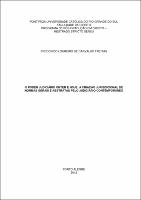| Share record |


|
Please use this identifier to cite or link to this item:
https://tede2.pucrs.br/tede2/handle/tede/4178| Document type: | Dissertação |
| Title: | O poder judiciário ontem e hoje : a criação jurisdicional de normas gerais e abstratas pelo judiciário contemporâneo |
| Author: | Freitas, Frederico Loureiro de Carvalho  |
| Advisor: | Tesheiner, José Maria Rosa |
| Abstract (native): | O presente trabalho visa a analisar a função judiciária e o processo civil sob dois momentos distintos: a formação do Código de Processo Civil de 1973 em sua estrutura originária e o período pós Constituição Federal. Para tanto, na primeira etapa são abordados alguns dos institutos do processo civil e algumas das principais características que exerceram influência na utilização e no modo de aplicar o direito durante esse período. São demonstradas com destaque as influências estruturais e seus reflexos na função jurisdicional exercida pelo Poder Judiciário. No segundo capítulo, o trabalho enfrenta o período pós-Constituição Federal de 1988 e as principais transformações daí decorrentes, que alteraram sensivelmente a estrutura do processo civil e a função jurisdicional. Na análise do processo civil e das características atuais da Jurisdição, o trabalho enfrenta o tema das súmulas vinculantes, da repercussão geral, do julgamento dos recursos repetitivos, dos denominados processos objetivos e das ações coletivas, para, ao final, concluir que o Judiciário passou a exercer uma nova função, qual seja, a criação de normas gerais e abstratas. A prevalência do interesse de garantir a resolução de controvérsias em uma perspectiva coletiva e transindividual demonstra a superação da ideia de que ao Judiciário caberia tão somente a tarefa de aplicar a norma geral ao caso concreto em ações com interesses puramente individuais |
| Abstract (english): | The current work aims to analyze the judicial function and civil procedure in two different stages: the formation of the 1973 Civil Procedure Code in its original structure and the period after the Federal Constitution. Therefore, firstly some of the institutes of civil procedure and main characteristics that influenced the practice of law during that period are analyzed, in an effort to demonstrate the structural influences over the judicial function exercised by the Judiciary. Secondly, the post- 1988 Federal Constitution period and its important consequences over the structure and functioning of civil courts are approached. Finally, this study examines the current characteristics of civil procedure and the judicial function, by looking into the institutes of binding precedents, general repercussion, repetitive appeals, the socalled objective processes and class actions. As a conclusion, it is possible to affirm that the Judiciary has to perform a new role: the creation of general and abstract rules. The prevalence of a collective perspective in dispute resolution demonstrates the overcoming of the idea that the main role of the Judiciary would solely be to apply general law to particular cases, which involved primarily individual interests |
| Keywords: | DIREITO DIREITO PROCESSUAL CIVIL JURISDIÇÃO CONSTITUIÇÃO - BRASIL |
| CNPQ Knowledge Areas: | CNPQ::CIENCIAS SOCIAIS APLICADAS::DIREITO |
| Language: | por |
| Country: | BR |
| Publisher: | Pontifícia Universidade Católica do Rio Grande do Sul |
| Institution Acronym: | PUCRS |
| Department: | Faculdade de Direito |
| Program: | Programa de Pós-Graduação em Direito |
| Citation: | FREITAS, Frederico Loureiro de Carvalho. O poder judiciário ontem e hoje : a criação jurisdicional de normas gerais e abstratas pelo judiciário contemporâneo. 2012. 25 f. Dissertação (Mestrado em Direito) - Pontifícia Universidade Católica do Rio Grande do Sul, Porto Alegre, 2012. |
| Access type: | Acesso Aberto |
| URI: | http://tede2.pucrs.br/tede2/handle/tede/4178 |
| Issue Date: | 5-Jan-2012 |
| Appears in Collections: | Programa de Pós-Graduação em Direito |
Files in This Item:
| File | Description | Size | Format | |
|---|---|---|---|---|
| 437830.pdf | Texto Parcial | 97.97 kB | Adobe PDF |  Download/Open Preview |
Items in DSpace are protected by copyright, with all rights reserved, unless otherwise indicated.




